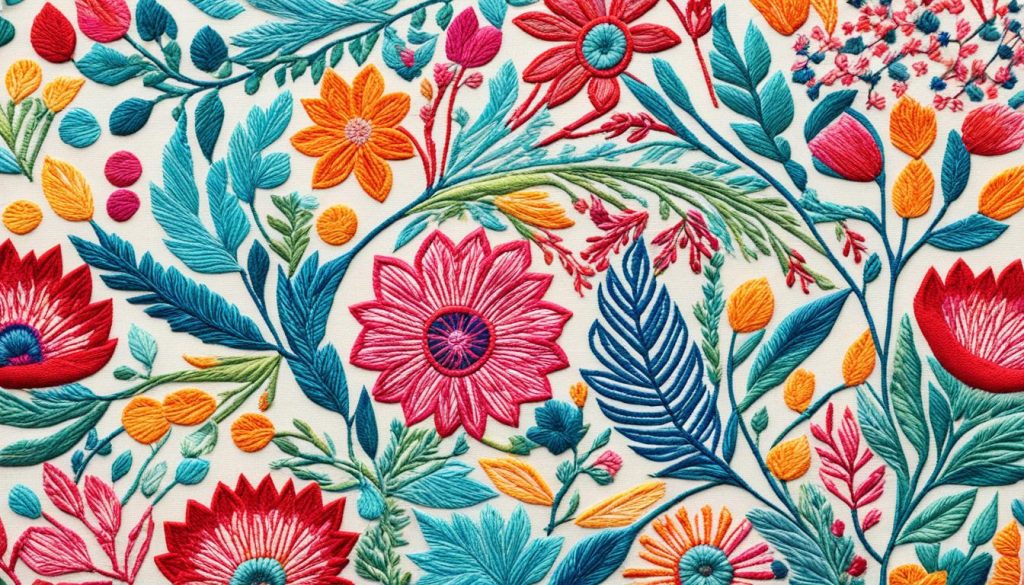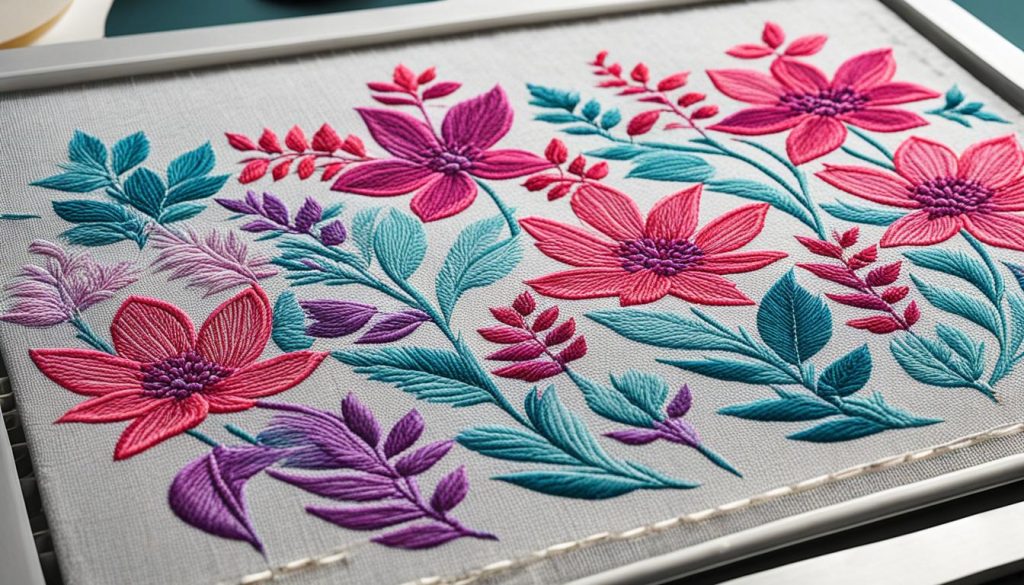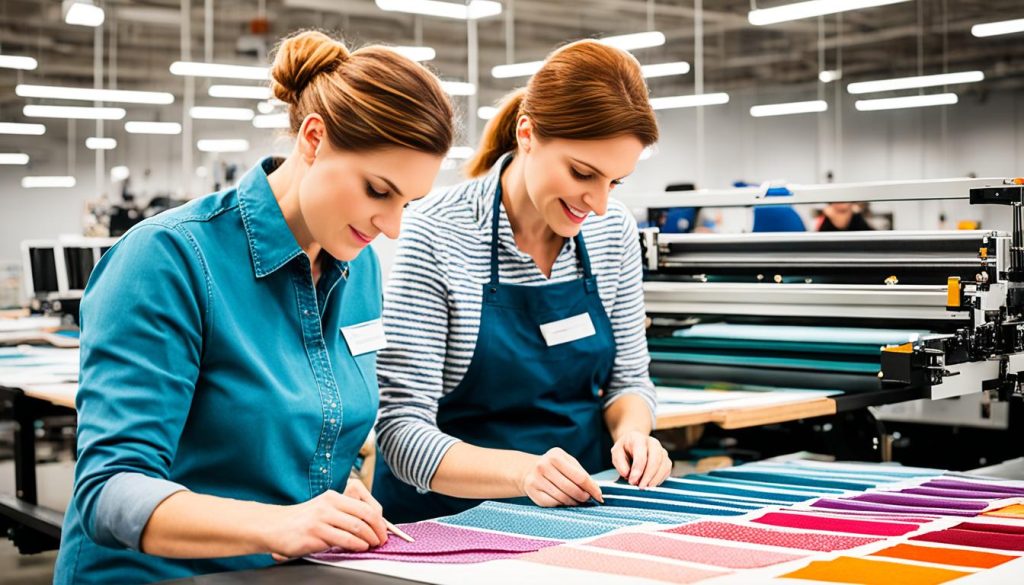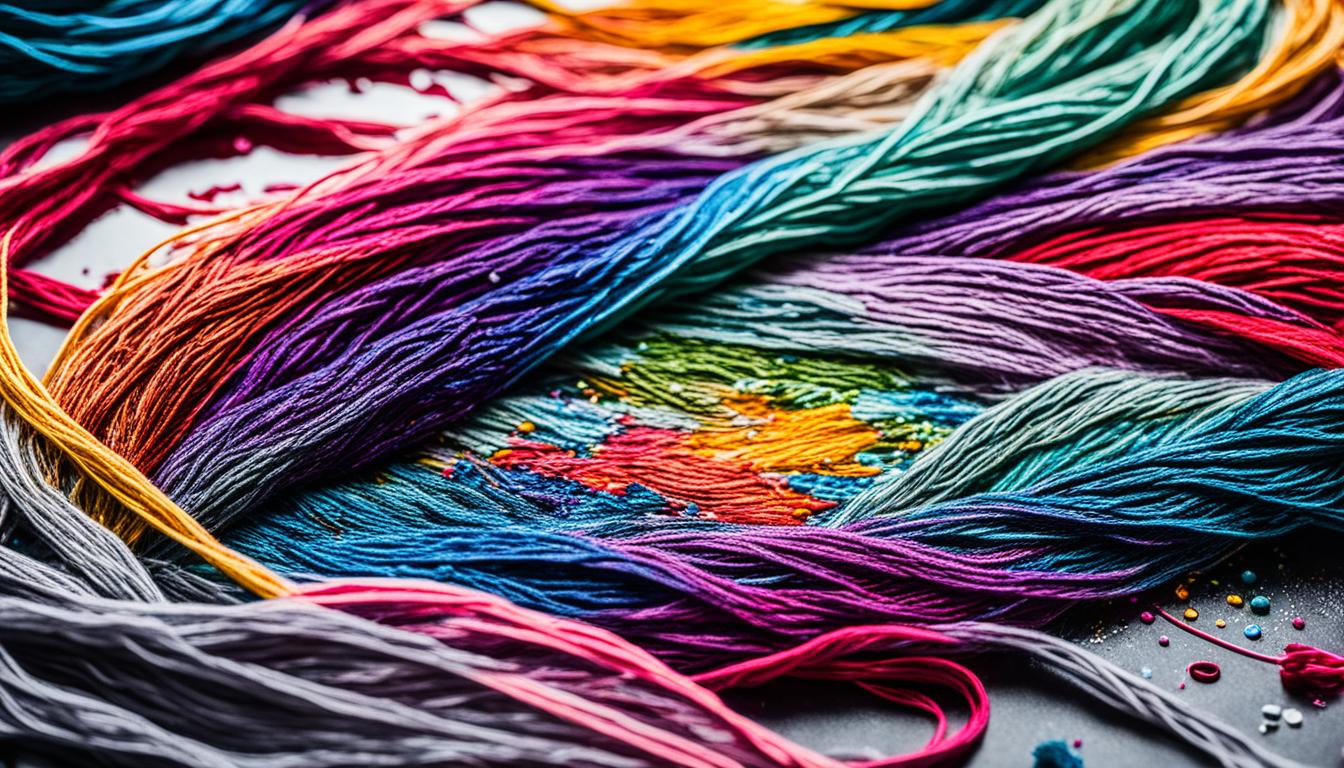Combining embroidery with screen printing might sound complex at first, like mixing oil and water. However, skilled experts have found ways to merge these techniques. This results in amazing custom embroidered designs enhanced by screen printing. Concerns about the impact of layering these methods are valid, but can be overcome. So, what’s the deal with overlaying embroidery on screen printing?
Embroidery and screen prints can work together. Using water-based inks can make the process smoother. This reduces the chance of ink cracking when applying embroidery over the prints. The way you hoop the fabric and how you avoid stretching it are also key. These steps help keep both the embroidery and screen printing intact. By considering these, you can make a great mix of both techniques on various fabrics.
Key Takeaways
- Embroidery patterns can be combined with custom screen printing without compromising either technique.
- Water-based inks are preferred to avoid cracking during embroidery.
- Proper material selection and careful fabric hooping are essential to maintain design integrity.
- Screen printing adds detailed graphics, while embroidery provides texture and durability.
- This combination enhances the appeal of custom embroidery designs on various fabric types.
Introduction to Combining Embroidery and Screen Printing
Embroidery and screen printing together are becoming more popular in fashion. This mix offers a new look that many people love. It combines the touchable textures of embroidery with the colorful designs of screen printing.

Understanding the Basics
Embroidery creates raised patterns by stitching into fabric. Screen printing uses stencils to apply ink for smooth, colorful images. Both methods share a love for lasting quality and eye-catching designs.
Learning embroidery shows the need for precision and care. Knowing screen printing means understanding how to set up stencils and manage ink well for good prints.
First Thoughts on Combining Techniques
Mixing embroidery with screen printing seems hard but can be done well. With a good plan and understanding of the processes, great things can happen. You can turn plain clothes into amazing pieces by combining these two.
Customers love this mix on items like t-shirts or bags. It shows a need for creators who know both embroidery and screen printing.
By combining these techniques, designers open up new design paths. They can play with where they place designs, the types of finishes, and more.
| Aspect | Embroidery | Screen Printing |
|---|---|---|
| Pricing | 8/10 | 7/10 |
| Longevity | 8/10 | 6/10 |
| Large Patterns | 5/10 | 8/10 |
| Heavy Fabrics | 9/10 | 5/10 |
| Thin Fabrics | 4/10 | 9/10 |
| Color Options | 7/10 | 8/10 |
| Turnaround Time | 7/10 | 6/10 |
| Overall Score | 7/10 | 7/10 |
Advantages of Combining Embroidery with Screen Printing
Using Modern embroidery and Durable screen printing together brings many benefits. It makes your projects look better and attract more attention. You get to use the best parts of both methods. This means your final products will do well in the market.
Unique Aesthetic Appeal
Combining embroidery with screen printing makes designs stand out. Embroidery adds a 3D and textured look to printed designs. It makes your clothes not just look fancy but also feel premium. This is great for detailed or fancy designs that need to last.
Durability and Versatility in Design
Modern embroidery is tough against rough use, like in workwear. Screen printing, however, keeps designs bright wash after wash. Together, they keep your designs looking sharp for a long time. This blend is great for detailed pieces that need to stay beautiful.

Cost-Effectiveness for Bulk Orders
For big orders, using both methods saves money. Screen printing is efficient for lots of clothes because it’s cheap to set up. Embroidery can then be added for a special touch without raising costs. This combo is perfect for making many high-quality items without spending too much.
Here’s a comparative table outlining the key benefits and applications:
| Feature | Screen Printing | Embroidery |
|---|---|---|
| Aesthetic Appeal | Vibrant and detailed | Textural and premium |
| Durability | Resistant to fading | Long-lasting under tough conditions |
| Cost-Effectiveness | Efficient for large batches | Scalable for bulk orders |
| Versatility | Works on various surfaces | Ideal for select garment types |
Combining Modern embroidery with Durable screen printing is a smart way to make eye-catching, long-lasting designs for many uses.
Technical Considerations
Mixing embroidery with screen printing needs careful planning. It’s about making sure the art and the method work well together for a top-notch finish.
Challenges in Setup
Linking screen printing and embroidery setups poses a big hurdle. Screens need detailed designs and exact placement, while embroidery turns art into stitch patterns. Pulling these together is key for smooth, flawless designs.

Material and Fabric Selection
Picking the right material is crucial in merging these methods. The material must handle the weight of embroidery and the feel of screen inks. Knowing the fabric’s weight guides us to a functional, quality result.
Production Process
The way we apply embroidery and printing has to be smart. The timing of ink drying, and keeping the fabric tight, stops distortions. Also, working together well in production boosts speed and quality.
Embroidery
Embroidery is a way to make fabric artistic with a needle and thread. You can go for the detailed, personal feel of hand embroidery or choose machine embroidery for quick, many-at-once production. Today, machines mean you can embroider many items together, which is great for making things like uniforms look professional.
With embroidery, you get to pick what’s best for you from styles like flat, puff, and patch. This means you can make custom embroidered designs that fit what you need. Plus, the cost doesn’t usually change no matter how many colors you use. So, embroidery is cost-efficient for colorful, detailed designs on cloth.
Still, there are some things to keep in mind. Embroidery might not be the best for designs with color gradients or on things that need to repel water. In those cases, screen printing could work better. By choosing between hand embroidery and machine embroidery, you can make custom embroidered designs that are both strong and look good.
| Item | Price | Discounted Price |
|---|---|---|
| Animals Embroidery Set | $19.99 | $30.00 (Original) |
| 3D Fabric Flowers Design Set | $10.00 | $15.00 (Original) |
| Applique Embroidery | $7.99 | $14.99 (Original) |
And there are cool deals to check out too. Designs in Machine Embroidery has sales from 13 to 80% off, plus free shipping in the U.S. And if you buy a machine now, you might get a Free Embroidery Bundle worth over $500. This adds a lot of value to your new purchase.
Best Practices for Combining Techniques
To blend embroidery with screen printing, there are key tips to remember. First, adjust your design to work best with both methods. Also, handle thicker prints well. Make sure you have the right tools and materials too.
Optimizing Design and Layout
Planning is key for mixing embroidery and prints. You should decide how to place each technique. This prevents problems like bulkiness and helps everything look neat. Starting with watercolors is affordable and easy. Use fabrics that won’t let colors spread, like unbleached cotton.
Tips for Handling Thick Prints
To deal with thick prints, be cautious. Avoid needle damage and ink cracking. You can use water-based inks or lessen the amount of ink where embroidery goes. For items that get washed often, like t-shirts, use acrylic paint. It’s water-resistant when dry. Adding a fabric medium, such as Liquitex, to the paint helps keep it flexible and vibrant on materials like denim.
Proper Equipment and Supplies
The right tools make combining embroidery and screen printing easier. Pick machines that can handle stretching material. High-quality threads and inks are crucial for lasting work. For detailed embroidery, use the best materials, like Legacy’s Alba Maxima linen. Proper needles speed up your stitching too.
| Tool | Purpose |
|---|---|
| Evertite Frames | Holds fabric taut for hands-free embroidery |
| Needlework System 4 Stands | Supports frame securely, improving control |
| Tambour Needles (Size 110/130) | Speeds up chain stitch filling |
| Tulip Milliners Straw Needles #10 | Ideal for detailed epp work |
| Liquitex Fabric Medium | Enhances flexibility and durability on fabrics |
By following these guidelines and using the right tools, you can create amazing art. Proper planning, choice of materials, and the right equipment lead to stunning work. This way, you blend embroidery hoop art and screen printing beautifully.
Conclusion
Embroidery with screen printing combines old and new, giving us the best. It lets your work stand out. This mix brings new customers to your embroidery business. And it’s popular on Instagram, with about 4.5 million posts under #handembroidery. People are noticing hand-stitched pieces, using them in events and for calming activities.
It’s important to know about both methods and the tools and materials you need. By mixing different styles, like Brazilian with simple cross-stitch, you can make outstanding pieces. You can also add personalized text with embroidery fonts. This makes your work not only beautiful but also in line with the slow fashion movement, known for quality and sustainability.
If you’re into crafting, this combo offers exciting possibilities. Use the right supplies and keep an eye on what customers like. Learning from online courses can really help improve your skills and make your projects better. This keeps you ahead in the world of textile arts.
